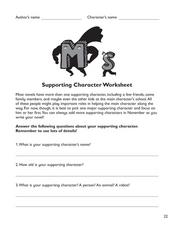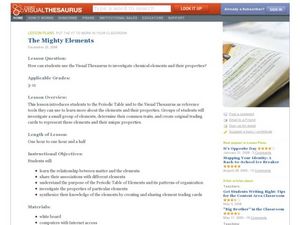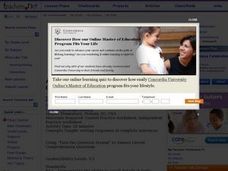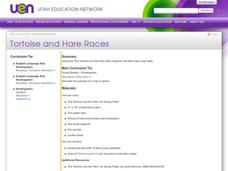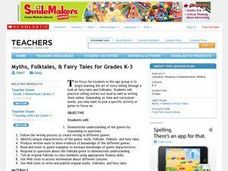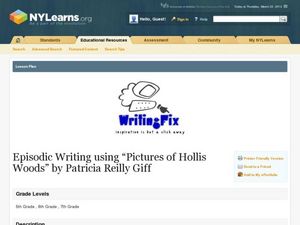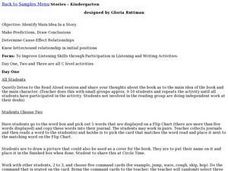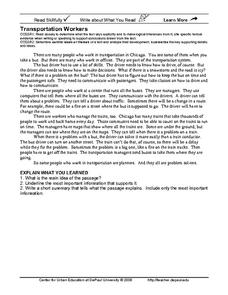Curated OER
Lesson Plan 13: Going Deeper Mini-Lesson
November is NaNoWriMo, or National Novel Writing Month! If your class is participating (or simply doing a narrative writing unit), this peer review lesson is part of a larger unit which can be easily found online. Once your writers have...
Curated OER
Supporting Character Worksheet
Where would Harry Potter be without Ron Weasley? Where would Holmes be without Watson? Where would a good narrative be without an interesting supporting character? Encourage character analysis with this resource, which includes six...
Curated OER
Main Idea in Informational Text
Individuals complete a pre-assessment to gauge their ability to determine the main idea and supporting details in nonfiction text. They examine a new piece of nonfiction reading by looking at the table of contents, headings, and index...
Curated OER
Introduce a Weather Unit
Engage your learners by playing Water Music Suite by Handel. Different types of weather sounds play on the recording, and it's an easy lead into talking about the weather! What is weather? What kinds of weather exist? What is it called...
Curated OER
Visualization: Cricket in Times Square
After reading The Cricket in Times Square chapter titled "Caught in the Kitchen," learners list three describing details about the characters and setting. Groups collaborate to find sensory details to support their character assertions....
Curated OER
The Mighty Elements: Using the Visual Thesaurus to Investigate Chemical Elements
Pupils create trading cards for elements in the Periodic Table. Initially, they are introduced to the Periodic Table of Elements and the concept of elements in the world around us. After dividing into groups, learners use the Visual...
Curated OER
Lesson 3: Distinguishing the Author's Purpose
It is true that the more you practice something, the better you'll get at doing it. Lesson three in a three part series on author's purpose has kids venture out to determine the author's purpose in three different passages. They'll read...
Curated OER
Answering Literal Comprehension Questions
Practice using the Turn the Question Around (TQA) method to answer reading comprehension questions based on short narrative paragraphs. Instructions and materials are included for direct, guided, and independent instruction. Responses...
Curated OER
Finding the Main Idea
The carnival is in town! After reading a short excerpt about a day at the carnival, learners use details to determine the story's main idea. They must differentiate the details from the big picture, as there are multiple options they can...
Curated OER
Tortoise and Hare Races
Practice basic map skills with the story of The Tortoise and the Hare. After listening to the story, class members create a map that indicates the starting line, the path the animals took, where they stopped to rest, and the finish line....
Curated OER
Bug's Eye View
Investigate the life of bugs and how they interact with the environment in this integrated science and language arts lesson. Young scientists construct mini environments in cages in order to make observations. This data forms the basis...
Curated OER
Express Yourself
First graders identify details that make reading and writing more interesting. They classify events, people, places, and things and attach specific characteristics to each one. Everyone generates describing words on a worksheet that's...
Curated OER
Retelling the African Folktale Abiyoyo
Act out the African folktale Abiyoyo. Kindergartners listen to the tale and discuss the characters, dressing as their favorite characters in order to retell and perform Abiyoyo using props. They will gain an understanding of story...
Curated OER
Myths, Folktales, & Fairy Tales for Grades K-3
Have your class explore the art of storytelling through this lesson on fairy tales and folktales. Learners interact with a variety of fairy tales and folktales. They practice telling stories out loud as well as writing their own. This...
Curated OER
Episodic Writing Using Pictures of Hollis Woods by Patricia Reilly Giff
Help your middle-schoolers expand their writing skills with this lesson on episodic writing, which focuses on story details, idea development, and organization. After reading "The Eighth Picture: End of Summer" from Patricia Reilly...
Curated OER
Read All About it
Learners create and publish a newspaper that reflects and explains pioneer and medieval societies. They become newspaper writers for a specific time period. They adopt a holistic approach to exploring community life in medieval and...
Curated OER
Identify Main Idea in a Story
Help your kindergarteners identify the main idea in a story. Small groups work with the teacher to make predictions and draw conclusions. They are able to determine cause and effect relationships. The lesson plan is divided into several...
Polk Bros Foundation
A Way to Analyze Paragraphs to Figure Out the Main Idea of a Nonfiction Text
Shrink up a section by asking pupils to write down the main idea for each of seven paragraphs. There is a space provided for each main idea. When students have completed this portion, they write down what they think to be the central...
Curated OER
Transportation Workers
Summarizing a text means being able to identify supporting details. Your class can learn about transportation workers in Chicago as they read a one-page informational passage. When they are finished reading they'll explain what they've...
Curated OER
Today’s Telephone
Does your class know the history behind today's telephone? They will after reading a very interesting one-page informational passage. They'll learn all about the way phones have progressed to the amazing devices they've become as they...
Curated OER
Space Food
What do astronauts eat in outer space? Kids can read an informational passage to learn about space food. The passage includes prompts that have learners identify the main idea and key details, then write a paragraph summarizing the text....
Curated OER
Hermeneutics: Teaching Students Author's Purpose
Your developing literary critics discuss 'perspective' and discuss how the same occurence can be interpreted by two different people in two different ways. They read Ryszard Kapuscinski's untitled poem, infer meaning of the poem, and...
Curated OER
Anticipation Guides Improve Reading Comprehension
Beginning with anticipation guide strategies is a powerful method for improving reading comprehension. First, list initial ideas for a topic the class will be reading about. These ideas are formulated into statements, some of which are...
Curated OER
Detail Detective: Story Activity
In this story detail worksheet, students complete a graphic organizer, filling in details about a story read and what characters see, hear, smell, taste, touch and where they go.



